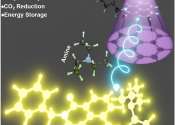Researchers discover photo-induced charge-transfer complex between amine and imide
A research team led by Prof. Zhang Guoqing from the University of Science and Technology of China (USTC) of the Chinese Academy of Sciences (CAS) has discovered a highly reactive photo-induced charge-transfer complex (PCTC) ...









